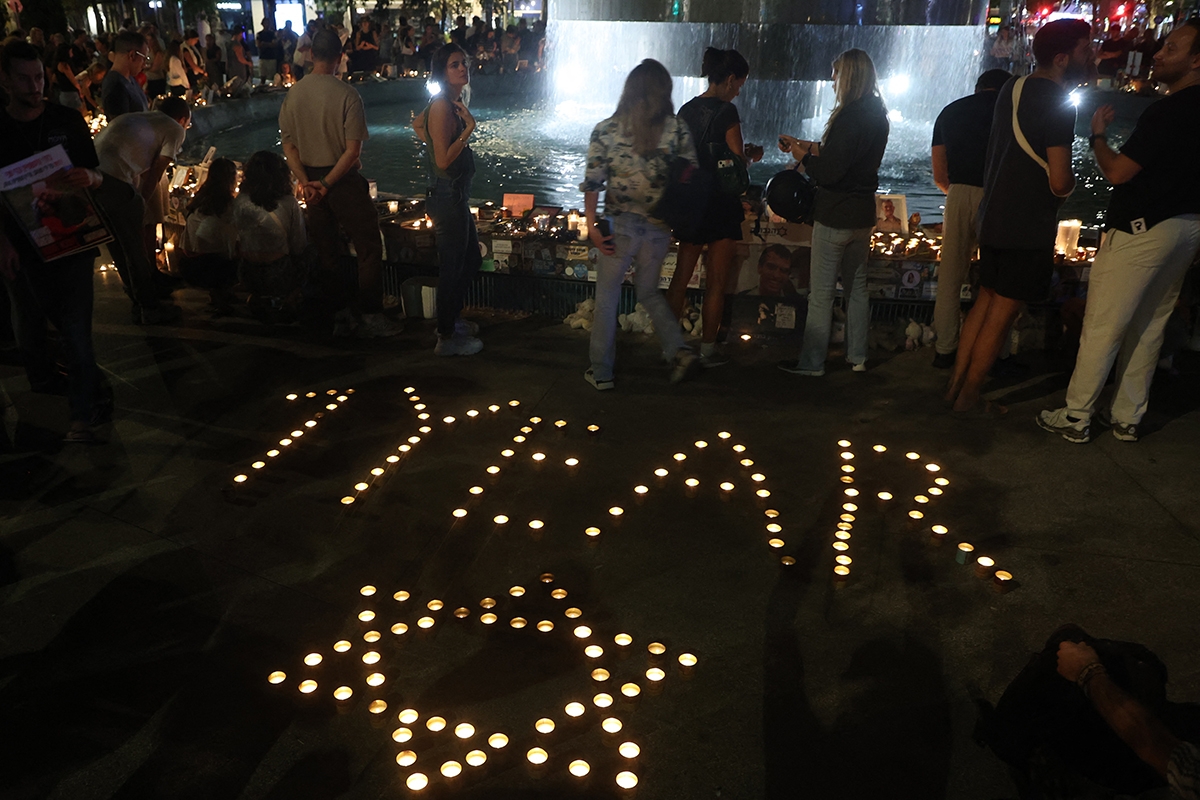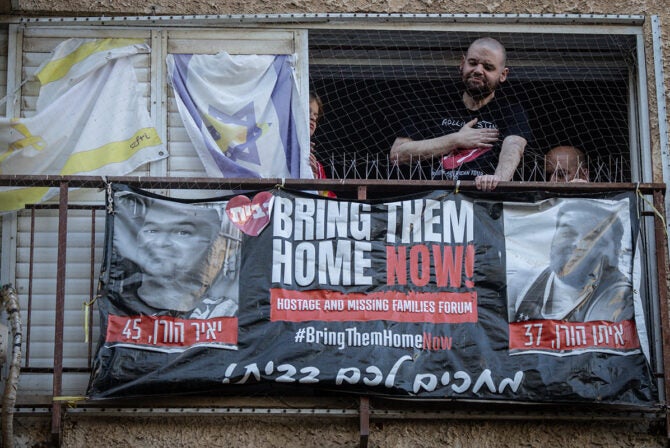Editor’s note: This piece originally ran on Oct. 7, 2024. We are republishing it today for the second anniversary of the October 7 attacks.
Last year on October 7, I hosted a play date. My phone kept dinging with WhatsApp messages from my family in Israel; I smiled and offered the kids treats as my world was crumbling around me. When the play date was over, I got behind the keyboard and put together a story for this very publication about what was unfolding.
Ever since then, it’s all felt like trying to hold my head above water. Almost every day, writing for Kveller, I dive back into the oily murky black waters of the Jewish story. I write about our grief and our humanity in the aftermath of this seismic shift, I stay underwater for as long as I can, and then I lift my head back up for a breather. And then, between caring for my home and my kids, I dive back in for the stories of what is unfolding in the world beyond our story, and let my heart crack even more.
Like all of us, I’m not who I was on Oct. 6, 2023. My life has been forever changed, in part by all the stories I wrote this past year. As we wrap up the one year anniversary of the terrible attack, I want to look back at the people and the songs that have stayed with me; maybe they will help all of us, as we look back on this year, make some sense of events that defy sense. There are so many stories from this past year that I can’t stop thinking about, but these are the Jewish stories that I’ve written through tears. These are the stories that will never leave me.
I can’t stop thinking about Vivian Silver, about her hard-fought dream of peace that she never let go of. On the day of the attack, she even got on the radio to talk about peace from her home in Be’eri, telling a host she felt antagonized by, “We’ll talk more if I survive this.” It’s a dream that she passed down to her son Jonathan Zeigen, who now travels the world to share her wishes for a better world for Israelis and Palestinians.
I can’t stop thinking about Rachel Goldberg-Polin, her poetry that recognized the pain of all mothers, of her and her husband Jon reminding us that every person is a universe. And maybe more, as a mother of sons, I can’t stop thinking of Hersh Golberg-Polin: a beautiful boy, his father’s rav and teacher, who was his mother’s heart, who also dreamed of a better world, the words “Jerusalem is everyone’s” painted in his bedroom.
I can’t stop thinking of Alex Dancyg, who helped generations travel to Poland to witness the horrors of the Holocaust that his family survived, but who also preached a connection between Polish Jews and Poland, who was in love with culture and history. I can’t stop thinking of his granddaughter, Talia Dancyg, who despite losing her beloved grandfather still sings beautifully in hopes of others to return, marches and yells and remains strong and determined.
I can’t stop thinking of Abigail Edan, who spent over a month in captivity after being orphaned, of her brother and sister who spend hours hiding in their saferoom by themselves after their parents had been killed, of their aunt and uncle and their three children who rebuilt a family for them, made a table of five into a table for eight, created a home where their loved ones are always remembered, of how president Biden held that sweet girl in his arms.
I still cry when I see the videos of those hugs from November, so long ago now. Of the Avigdori family, little Noam, 12, choking through the tears in her father’s arm, the behind-the-scenes TV writer who made the country know his face fighting for the return of his wife and daughter. Of Maayan Ziv calling her daughters “yafot sheli,” “my beautiful ones.” Of Yoni Asher, who fought for his wife Doron and his two little daughters, sitting with them on that hospital bed as he asked his little ones, “did you think of dad? Did you think good things about me?” as Doron murmurs back over and over “all of the time,” and the girls nod at him. Of Emily Hand’s father’s red tearful face. Of Hadas Kalderon yelling out in victory in the middle of a crowded mall when she found out her two teens were on the list to be returned.
I can’t stop thinking about the hard journey so many of them are still on to return to normalcy, about the fact that so many of them will never get to come back home, because their homes are destroyed, under constant rocket fire.
And I think of all the hugs that weren’t. Of Hersh. Of Alex Lobanov, who never got to hug his second-born because he was captured while his wife was six months pregnant. Of Carmel Gat, who will never hike with her father again. Of way too many to bear to name.
I can’t stop thinking about Lilach Kipnis, the grandmother who wrote a book for kids who suffer from PTSD because of rocket fire, who was believed to be captured at first, then discovered to be dead.
I can’t stop thinking of Tamir Hershkovitz, returning to light a salvaged menorah in the home of his murdered parents and singing a song about believing in mankind in its ruins.
There’s a myriad of songs that won’t get out of my head. Like Ofra Haza’s “Chai,” like Mira Awad’s “Think of Others,” like Eden Golan’s “Hurricane.” Like Yoni Bloch’s “Between the Sea and the River,” where he sings: “I don’t know how/To arrange the words/How to touch you in the place/Of the wounds that you can’t see/How to promise you that this will be the war/That’s the most painful of all and the last of them.”
I can’t stop thinking of you, reading about all this along with me.
How are you?
Do you also cry at every news story like me?
Do you also feel underwater?
These stories are just the tip of an iceberg of impossible grief, just a few of so many that are all so hard to hold.
I hope you are OK, and if you aren’t, just know that you aren’t alone in being not OK.
May their memories be a blessing, may they be for a revolution, may they be for more beautiful days. I know that their memories will always be a part of me — and maybe they will always be a part of you, too.








